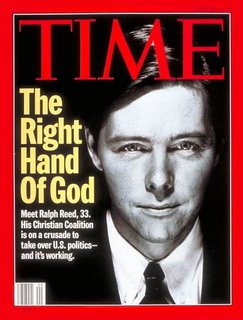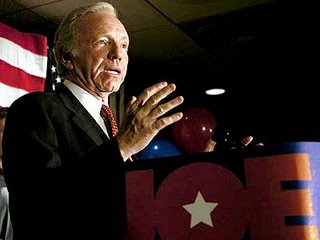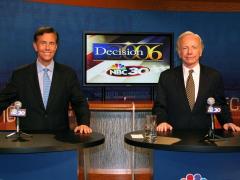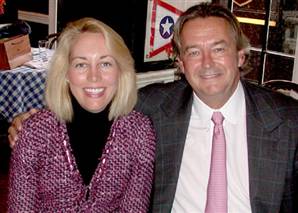Following up on
my Wilson/Plame lawsuit posting from a few days ago, in which I said I would go into further detail on the discrepancies between Bob Novak and ex-CIA spokesman Bill Harlow's recollections of their conversations about Joe Wilson and Valerie Plame prior to the publication of Novak's now infamous
July 14, 2003 column which outed her.
The whole dispute began in earnest last summer when the Washington Post ran
a front page story in which they interviewed Harlow.
Harlow, the former CIA spokesman, said in an interview yesterday that he testified last year before a grand jury about conversations he had with Novak at least three days before the column was published. He said he warned Novak, in the strongest terms he was permitted to use without revealing classified information, that Wilson's wife had not authorized the mission and that if he did write about it, her name should not be revealed.
Harlow said that after Novak's call, he checked Plame's status and confirmed that she was an undercover operative. He said he called Novak back to repeat that the story Novak had related to him was wrong and that Plame's name should not be used. But he did not tell Novak directly that she was undercover because that was classified.
After months of publicly refusing to answer questions about the leak case and his role in it,
Novak felt obliged to respond to Harlow's claims four days after the Washington Post ran its story.
Harlow said to the Post that he did not tell me Mrs. Wilson "was undercover because that was classified." What he did say was, as I reported in a previous column, "she probably never again would be given a foreign assignment but that exposure of her name might cause 'difficulties.'" According to CIA sources, she was brought home from foreign assignments in 1997, when Agency officials feared she had been "outed" by the traitor Aldrich Ames.
I have previously said that I never would have written those sentences if Bill Harlow, then CIA Director George Tenet or anybody else from the Agency had told me that Valerie Plame Wilson's disclosure would endanger herself or anybody.
A few days later, he was on CNN's "Inside Politics" where anchor Ed Henry was about to question him about the Plame leak, and a seemingly harmless exchange with James Carville over Katherine Harris in the Florida Senate race led to
this classic television moment.
NYU journalism professor Jay Rosen offered what I think is the best analysis of the whole incident. You can read his take on it
here.
Fast forward nearly a year later,
Novak writes another column, outlining his role in the investigation and again taking issue with Harlow, whom he identifies as one of his three sources for the story.
In the second to last paragraph, Novak writes
Following my interview with the primary source, I sought out the second administration official and the CIA spokesman for confirmation. I learned Valerie Plame's name from Joe Wilson's entry in "Who's Who in America."
However, even before the Novak-Harlow pissing match which began last year, there are more questions about what Novak knew, when he knew it, and who told him.
In 2004, Joe Wilson's book
"The Politics of Truth" was published. The book was mostly a memoir of his life in government service, but the parts everyone was interested in reading about of course was about the Plame leak.
I would recommend reading all of Chapter 17 ("A Strange Encounter with Robert Novak") but for those who don't have the book, the short version is that on July 8, 2003, six days before Novak’s column is published, an unidentified friend of Wilson’s tells him that he had run into Novak walking down Pennsylvania Avenue. He struck up a conversation with Novak on the uranium controversy and asked for his opinion of Wilson, and Novak (not knowing that this man was a friend of Wilson’s) responded, “Wilson’s an asshole. The CIA sent him. His wife, Valerie, works for the CIA. She’s a weapons of mass destruction specialist. She sent him.” Novak and Wilson’s friend went their separate ways, and Wilson’s friend went straight to Wilson’s office to tell him the story.
Wilson writes that he called then-CNN executive Eason Jordan and relayed the story to him, and asked him to speak to Novak on his behalf. Jordan eventually arranged for a phone call between Novak and Wilson. The phone call eventually happened two days later, on July 10. This is how Wilson describes it in page 344 of his book:
He listened quietly as I repeated to him my friend's account of their conversation. I told him I couldn't imagine what had possessed him to blurt out to a complete stranger what he had thought he knew about my wife.
Novak apologized, and then asked if I would confirm what he had heard from a CIA source: that my wife worked at the Agency. I told him that I didn't answer questions about my wife. I told him that my story was not about my wife or even about me; it was about sixteen words in the State of the Union address.
On page 345, he describes his reaction to the July 14 Novak column:
Amid the welter of emotions I felt that morning, I tried to understand a particular element of Novak’s story.
He cited not a CIA source, as he had indicated on the phone four days earlier, but rather two senior administration sources; I called him for a clarification. He asked if I was very displeased with the article, and I replied that I did not see what the mention of my wife had added to it but that the reason for my call was to question his sources. When we first spoke, he had cited to me a CIA source, yet his published story cited two senior administration sources. He replied: "I misspoke the first time we talked."
Wilson elaborates on some of the steps he and his wife took to try to protect her name from coming out once they knew Novak had the information:
A couple of days before Novak's article was published, but after my friend's strange encounter with him, I had received a call from [Washington] Post reporter Walter Pincus, who alerted me that "they are coming after you." Since I already knew what Novak had learned about Valerie, I was increasingly concerned over what else might be put out abotu her. I assumed, though, that the CIA would itself quash any article that made reference to Valerie... Novak had still been trolling for sources when we spoke on the telephone, so I assumed that he did not have the confirmations he would need from the CIA to publish the story. I told Valerie, who alerted the press liaison at the CIA, and we were left with the reasonable expectation that any reference to her would be dropped, since he would have no way of confirming the information - unless, of course, he got confirmations from another part of the government, such as the White House.
Novak has now admitted to having three sources, including Harlow at CIA. He spoke to Wilson's friend on July 8, the same day he spoke to Karl Rove as his confirming second source, according to
a story in the New York Times last summer. He may very well have misspoken when he first talked to Wilson on July 10, attributing his info about Plame to a CIA source. However, given that his CIA source for this story was Bill Harlow, and Harlow is saying something different, I'm wondering if it's possible to reconcile these two versions or not. Or Harlow may have inadvertently confirmed the Plame info before he knew it would be a hot potato or that it was classified information. What we still don't know yet is when Novak spoke to Harlow - was it before his July 8 conversations with Rove and Wilson's friend, after July 8 but before his July 10 conversation with Wilson, or after July 10 and before July 14 when his column was published?
Curiously enough, even though it has nothing to do with this subject, on July 8, Scooter Libby was meeting with New York Times reporter Judy Miller at the St. Regis Hotel in Washington DC, during which Valerie Plame was discussed. This was
first reported by investigative journalist Murray Waas in the American Prospect in August of 2005, before it was subsequently confirmed by
the Washington Post in September of 2005, and ultimately
confirmed by Judy Miller herself in the pages of the New York Times.
Back to Novak and Harlow,
Murray Waas reported for the American Prospect in February 2004:
Two government officials have told the FBI that conservative columnist Robert Novak was asked specifically not to publish the name of undercover CIA operative Valerie Plame in his now-famous July 14 newspaper column. The two officials told investigators they warned Novak that by naming Plame he might potentially jeopardize her ability to engage in covert work, stymie ongoing intelligence operations, and jeopardize sensitive overseas sources.
...
The two administration officials questioned by the FBI characterized Novak's statements as untrue and misleading, according to a government official and an attorney official familiar with the FBI interviews.
...
The two officials say Novak was told, as one source put it, that Plame's work for the CIA "went much further than her being an analyst," and that publishing her name would be "hurtful" and could stymie ongoing intelligence operations and jeopardize her overseas sources.
"When [Novak] says that he was not told that he was 'endangering' someone, that statement might be technically true," this source says. "Nobody directly told him that she was going to be physically hurt. But that was implicit in that he was told what she did for a living."
"At best, he is parsing words," said the other official. "At worst, he is lying to his readers and the public. Journalists should not lie, I would think." These new accounts, provided by two sources familiar to the investigation, contradict Novak's attempts to downplay his own knowledge about the potential harm to Plame.
Moreover, one of the government officials who has told federal investigators that Novak's account is false has also turned over to investigators contemporaneous notes he made of at least one conversation with Novak. Those notes, according to sources, appear to corroborate the official's version of events.
If this account is correct, I would guess that one of the officials in Waas' article is Harlow. If Novak did lie to investigators, that would be stupid and reckless on his part. On the other hand, if the FBI or Patrick Fitzgerald had the evidence to prove it, I'm sure they would have gone for an indictment against Novak.
Novak and Harlow's versions of the story are complete opposites. Unless we find out more details in a Fitzgerald document filing or during a court hearing, or the Wilson lawsuit is allowed to proceed and Wilson's legal team puts Novak and Harlow on the witness stand and start questioning them under oath, we may never know whose version is accurate.
The questions that Novak and Harlow need to answer to settle this:
1) When did Novak find out about Plame's CIA employment?
2) When did he contact Harlow or the CIA Public Affairs Office for confirmation? How does the timing of that conversation match up with other events happening during that time period?
3) How strongly was he warned or discouraged (if at all) about using Plame's name by Harlow or others?
4) Did Novak ignore the warnings and do it anyway?
5) Did Novak subsequently lie about it in public comments? Or is Harlow lying about trying to warn off Novak because he didn't want to admit as a confirming source he had passed on classified information?






















